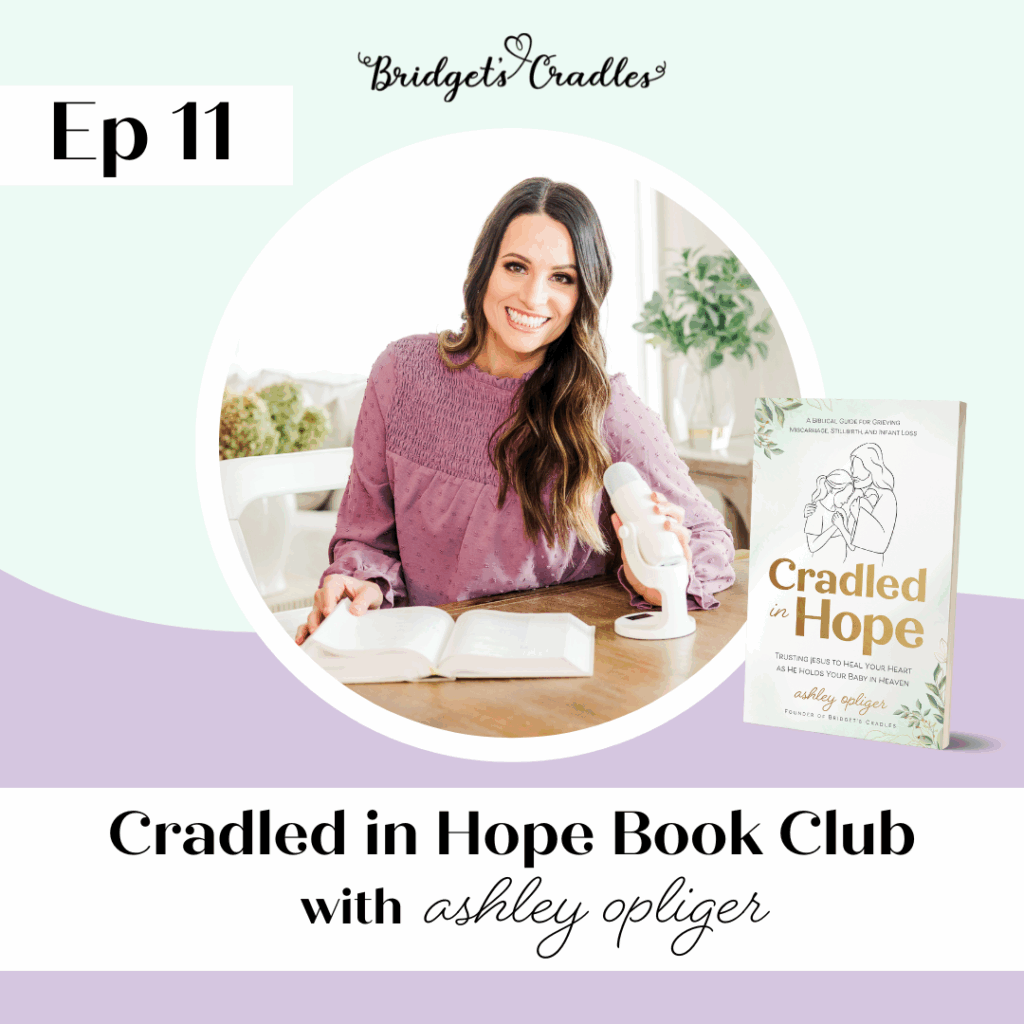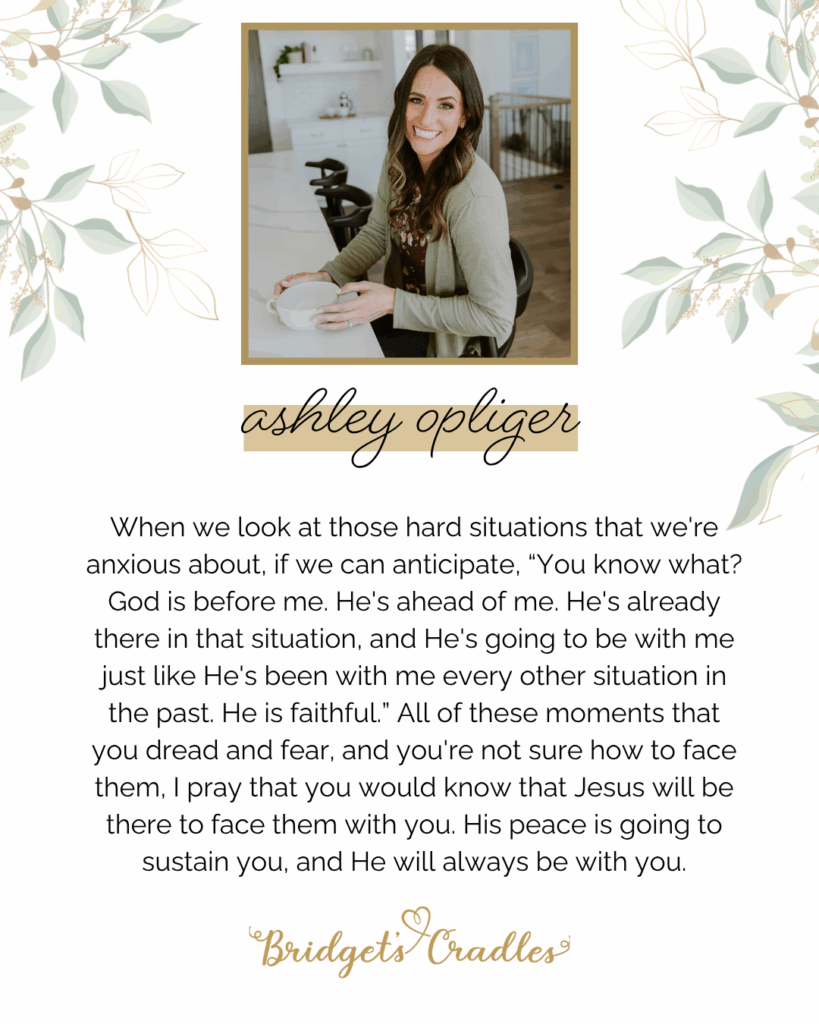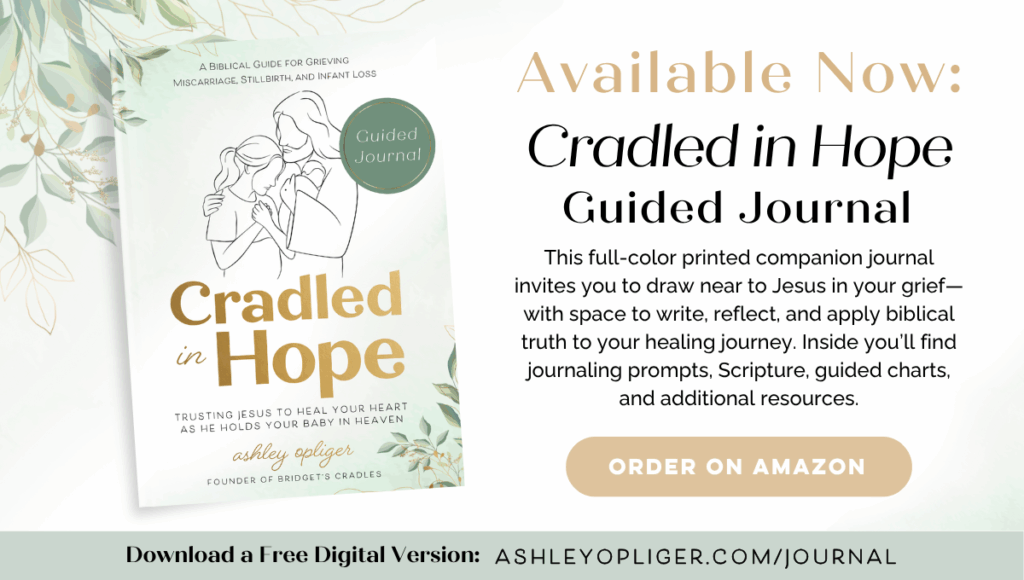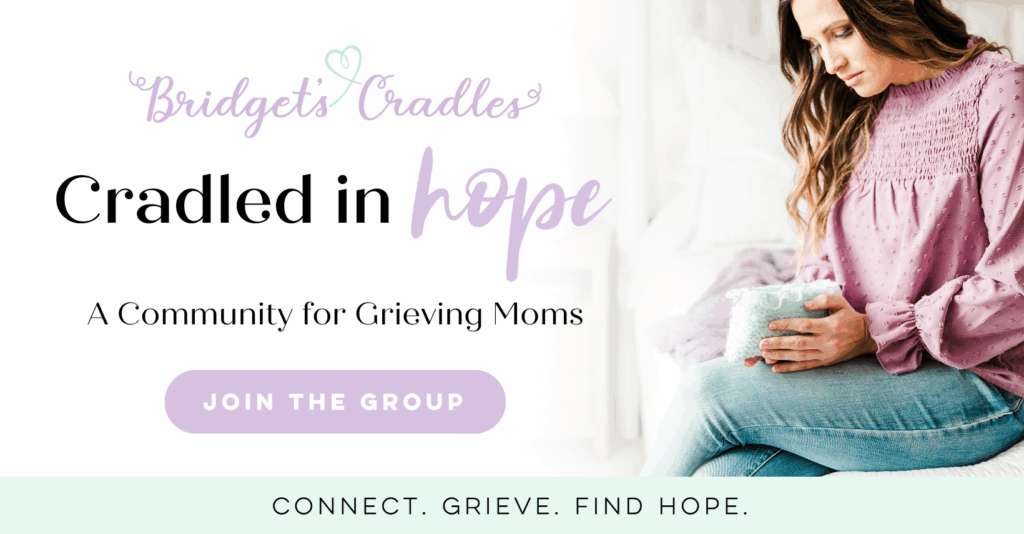Wave of Light | October 15, 2025 Register Now
registration open!
Ep 11 | Cradled in Hope Book Club | Ashley Opliger
November 3, 2025
filed under

In this episode, Ashley walks through the many ways grief after losing a baby can trigger anxiety, panic, and overwhelm in daily life. Centered on Chapter 10 of Cradled in Hope, “A Renewed Mind: When You Are Anxious or Triggered,” she shares real examples of past, present, and future (anticipatory) triggers and how they impact grieving moms emotionally and physically. Drawing from personal experiences and biblical wisdom, Ashley offers practical tools for navigating triggers and renewing your mind through Christ.
In this episode, Ashley shared:
- The difference between past, present, and future triggers—and examples of each from real life (like birth trauma, seeing baby items in stores, or dreading future events)
- Why grieving moms may relive the past or spiral in anxious thoughts (including “what if” ruminations and anticipatory anxiety)
- The neuroscience behind trauma and anxiety—including how amygdala hijack and the nervous system affect your reactions
- Practical ways to protect your heart and set healthy boundaries during grief (social media breaks, saying no to events, unfollowing or muting triggers)
- How to prepare for difficult situations and give yourself grace to step away if needed
- The power of grounding techniques and Scripture to calm your nervous system and refocus on the present
- How worship, biblical imagery, and speaking affirmations can bring peace in moments of panic
- Encouragement to seek counseling or professional help for intense grief, anxiety, or depression—alongside Christ-centered support groups
Ashley reminds grieving moms that protecting your heart is not selfish—it’s a wise and loving act that gives Jesus space to heal you. When we choose to invite Him into the overwhelm, He replaces our panic with His peace.

Journaling Prompt
What past, present, and future (anticipatory) triggers are you struggling with? Take time to inventory the places, people, or situations that impact you the most. What healthy boundaries could you set to protect your heart during this season?
Healing Step
Practice visual biblical imagery the next time you are anxious. Imagine Jesus sitting beside you and holding you through the fear. Or choose another grounding technique from this chapter—like Scripture memory, worship music, or breath prayers—and see how it calms your spirit and connects you to God’s peace.

Full transcript below.

New episodes will be shared on the 1st of every month. Don’t miss a single episode…subscribe wherever you podcast!
Please also leave a review to help spread the message of hope with other grieving mommas!

MEET OUR HOST
Ashley Opliger is the Executive Director of Bridget’s Cradles, a nonprofit organization based in Wichita, Kansas that donates cradles to over 1,600 hospitals in all 50 states and comforts over 30,000 bereaved families a year.
Ashley is married to Matt and they have three children: Bridget (in Heaven), and two sons. She is a follower of Christ who desires to share the hope of Heaven with families grieving the loss of a baby.
Connect with Ashley:
Facebook /ashleyopliger
Instagram @ashleyopliger
Pinterest /ashleyopliger
www.ashleyopliger.com
Follow Bridget’s Cradles:
Facebook /bridgetscradles
Instagram @bridgetscradles
Pinterest /bridgetscradles
www.bridgetscradles.com
JOIN OUR FACEBOOK GROUP FOR GRIEVING MOMS

EPISODE TRANSCRIPT
Ashley Opliger: [00:00:00] Welcome to the Cradled in Hope Podcast Book Club.
I’m your host, Ashley Opliger—grieving mom, author of Cradled in Hope, and founder of Bridget’s Cradles. I’m so honored to walk with you through my book, one chapter at a time, as we navigate the heartbreak of losing a baby together.
After my daughter Bridget went to Heaven at 24 weeks, I wrestled with deep sadness and complex questions about God’s goodness. But through that grief, Jesus showed me that He not only cradles our babies in Heaven, He also holds our broken hearts here on earth.
Whether you’re reading along or simply listening in, this is a safe space for your sorrow—a place where your tears, questions, and raw emotions are welcome. Each episode, we’ll reflect on a chapter of Cradled in Hope and gently walk together from heartbreak to healing, and from pain to purpose.
My prayer is that this podcast will remind you that you are not alone in your grief and, most importantly, that it will point you to Jesus, the only One who can truly heal your heart. Through faith in Him, there is hope to see your baby again, and He will be with you every step from here to Heaven.
So wherever you are in your journey, I invite you to join me—and together, we will grieve with hope.
Let’s begin.
Ashley Opliger: [00:01:22] Hi friends. Welcome back. Today, we are diving into Chapter Ten, A Renewed Mind: When You Are Anxious or Triggered. Let’s start by focusing on the key passage from the chapter. Today’s passage comes from Psalm 94:19. “When my anxieties multiply, Your comforting calms me down.”
The content from this chapter is something that we talk a lot about in our support groups, and it usually resonates a lot with grieving moms because after you lose a baby, there are inevitably so many different triggers that come up that can be really hard to navigate.
And so the opening part of this chapter is sharing a story about what it feels like to be out in the world and for something to remind you of your baby and the loss of your baby. And I use the example of being out at a store and you’re in the checkout lane, and someone in front of you is buying stuff for their baby, and how that can really cause you to well up with emotion.
[00:02:20] And so I don’t know what it is for you. There’s probably been so many different circumstances that you’ve walked through after losing a baby that can really throw your emotions into a tailspin and cause you to just have this overwhelming sense of grief that just floods your body and your mind.
[00:02:36] And so I list examples of different triggers that can happen, and I express that there are three different kinds of triggers. There’s past triggers, present triggers, and future triggers, or I also call those anticipatory triggers.
So I’m going to explain what those are. I’m going to give a couple of examples. I’m not going to read directly from the book or share all of them, but just to give you an idea of what these kinds of things might be, and that way you can be doing a mental checklist as you’re listening to identify what kind of triggers are happening most frequently for you, and which ones might be a source of panic and anxiety for you.
[00:03:11] Past triggers would be anything that has happened in the past that you are ruminating on. It might be reliving your baby’s birth experience, their death, their funeral, or another traumatic event related to your baby. It might be the day that you went into the doctor’s office and you found out there was no longer a heartbeat, could be when you had to hand your baby over to the hospital and leave the hospital empty-handed. It could be at their burial, something that was just very triggering and overwhelming, and so just reliving the past.
[00:03:42] Another example of a past trigger would be obsessively replaying the what-ifs in your mind, looking back on your pregnancy and wondering if there was something that you could have done differently to prevent the loss of your baby. Maybe it’s that you are just really thinking you should have done something. You wish you would’ve noticed something sooner, you wish you wouldn’t have eaten something. There’s a lot of different examples I’ve heard mothers share with me, and so just really ruminating on the past and things that you wish that you could have changed.
[00:04:10] And by the way, when I’m sharing these with you, if you are resonating with these, this is not to condemn you and be like, “Oh, there’s something wrong with me.” This is just for you to identify where the source of your triggers might be, and it might be multiple areas.
[00:04:24] It might be that you’re like, “I have past, present, and future triggers that are bothering me,” and that was the case for me and in the early days of grief. And I still struggle with some of these. And so I just want to say this is more for us to explore what is causing our anxiety, and then I’m going to be sharing in the later part of the book of how we can cope with strategies that are healthy and how we can invite Jesus in to these moments.
[00:04:50] If you are resonating with these, this is not for you to feel bad. This is just for you to self-reflect on the kinds of thoughts you’re thinking and the kinds of external triggers that are bothering you.
[00:05:02] Present triggers: This list in my book is the longest because I could think of so many different things that are happening in the present in your grief that would remind you of your baby and cause additional grief.
[00:05:12] Examples would be seeing a pregnant woman or a newborn baby, having someone that has a due date similar to you that you work with or a neighbor, and having to watch them through their pregnancy and you know you would’ve been having a baby at the same time.
This could be being out in public, like I mentioned at the beginning of this episode, about being at a store and seeing someone buy baby clothes or baby items that they need, or even just passing by the aisle in the store can be really hard.
[00:05:42] Getting emails about your baby, maybe you signed up for various registries and you’re getting different emails from like Baby Center or a pregnancy app that you were following and you’re getting notifications on your phone.
Obviously social media can be a place where a lot of triggers come, so you might be seeing pregnancy announcements, gender reveals, different things like that can be really hard.
[00:06:02] Sometimes being at church can be overwhelming if you are witnessing baby dedications or baptisms can remind you of the baby that you lost and the grief that you’re experiencing.
[00:06:13] There are many more that I mentioned in here, including some of the physical aspects of grief after you lose a baby. It could be that your milk coming in is a trigger, having to still wear maternity clothes or conversely, having to pack them away because you don’t need them anymore. There’s so many different triggers that can happen as you’re walking through the grief of losing a baby, and each person’s triggers might be a little bit different from someone else.
[00:06:41] The future or anticipatory triggers: Those are things where you’re thinking and worried about something that will happen in the future. So this would be thinking about Sunday morning, going to church and being like, “I am so worried I’m going to be sitting next to a pregnant woman, or crying baby,” and it’s causing you anxiety and it’s making you not want to go to church.
[00:07:00] Or it could be you are going to a social event and you know you’re going to be around certain people and you’re worried about how they’re going to treat you, what they’re going to say, if they’re going to bring up your baby or not, if they’re going to ask you how you’re doing, just walking into a situation worried about how that’s going to play out.
[00:07:17] It also might be fretting over how you will handle a situation. So, you’re going to a work event, you’re going even just to work itself, and you’re like, “I don’t know how I’m going to handle it if I start crying at my desk. What am I going to do?” Also, dreading upcoming holidays or milestones, maybe it’s your baby’s due date or their Heaven Day.
[00:07:36] I know for me, in my grief journey, a lot of times the anticipation of those hard days was even worse than the day itself. In fact, the days and weeks leading up to those days were much harder grief days for me than the actual day because I was just anticipating how heavy that was going to be.
[00:07:52] And so those are some examples. As I said, I want you to go into my book and look. You can read those on pages 169-170 to get a further list. But there’s probably many things that I left out that are very unique to your situation, so what I want you to do really is to be thinking about: What is it that’s triggering to you? What circumstances, what people, what places, things that are happening in your world that are causing you additional grief?
[00:08:21] So let’s lead in now to: What are we going to do about this? How do we handle this? And why is this even going on to begin with? If you’re following directly in my book, you’re going to see that I’m skipping a little bit here, but I want to address the question, “Why is this even happening,” before I get into some ideas on how to protect yourself.
[00:08:38] “Amygdala hijack”. It is a term that is essentially when the amygdala, which is deep in the middle of your brain, and they are these neurons and they are in each cerebral hemisphere, and essentially they are in charge of processing emotions and memories associated with fear.
[00:09:00] And so the amygdala basically regulates the fight, flight, or freeze response. And so whenever you have a perceived threat or trigger, that part comes online. And the prefrontal cortex, which is in your frontal lobe, which is supposed to calm down the amygdala, sometimes that part can go offline, and that’s what’s called an amygdala hijack.
[00:09:21] It’s basically the amygdala is hijacking your brain. Instead of being able to reason and rationalize with the front part of your brain, the amygdala is overriding that rational thought because of some intense emotional reaction. And that is a very real brain phenomenon that can happen.
[00:09:39] And so it’s very important to understand that sometimes when these things happen and it feels so overwhelming in the moment, and we’re like, “Why did we react like that? Why was that so overwhelming,” it actually is a part of the PTSD that we’re experiencing from such a traumatic event of losing a baby. And it’s part of our brain processing these things.
But it’s helpful to know that this can be happening in these circumstances, and the front part of our brain is not functioning as it normally should be, because we have this overwhelming emotion, that the amygdala is responding to this trigger and overriding our rational thought.
[00:10:18] So I want to first express that that is a reason why it happens. I’m going to later express how we can help calm our brains down and get our prefrontal cortex back online.
But let’s now talk about some of these coping mechanisms of dealing with all of these triggers, because we’re not going to be able to avoid every person, place, or situation that causes these triggers. It’s not going to be possible.
[00:10:43] I do think there are things that we can do to limit those exposures, and that’s the first thing I want to share right now is: How do we protect our hearts from these? I do think that it’s wise to try to do some things to nurture our hearts in this time, because if you think about our heart, we have a broken heart and we should treat that with the same care and attention that we would give a physical injury.
[00:11:04] And it feels very different because it’s like, when you break a leg, there’s crutches and you have all of these things where people can physically see that you’re injured, and so you’re going to be taking special precautions. But when you have a broken heart, it feels a little bit different, and we feel like we can keep functioning the way that we were before.
[00:11:19] And that’s not true. We are dealing with a broken heart, and we should give our heart time and space to heal, and we should try to protect it from further pain as much as we can without putting ourselves in a bubble where we’re not going anywhere or doing anything.
[00:11:33] But some of the ideas that I mention that are, I think, very practical ways to safeguard our hearts so that Jesus can do His healing work inside of us is to adjust our schedule to make time for grieving and to being with Jesus. There are some places that we can avoid and events that we can avoid due to it causing anxiety.
[00:11:52] Obviously if work is causing us anxiety, that’s something that would be harder to avoid. But if it’s a optional work, social event after work hours, that might be something, “That’s not mandatory. I don’t need to do that. And if I think that’s going to cause me additional stress and I’m just feeling so exhausted from my grief, maybe that’s something that I can say no to.” I think that would be a very wise and understandable thing to do.
[00:12:18] Also, if there are interactions that you feel like with certain people that are really triggering to you, if you can reduce the number of those interactions in a respectful and gracious way, I think that that can be something that’s very helpful in the temporary time that you need with the Lord to do the healing work.
[00:12:35] Also, preparing for situations in advance, giving yourself an out. If you’re going to something and you’re not sure how you’re going to handle it, knowing that it’s okay to leave early, it’s okay to step into another room to cry, whatever it is, just giving yourself grace and understanding that when you step into these situations, that you do have options.
[00:12:56] I use an example that, after I lost Bridget, there was a women’s Bible study that I decided to leave, and that was a hard decision because it felt like I should be wanting to study the Bible with other women. But all of the other women were either pregnant or nursing brand new little babies, and I was the only mom there that did not have a baby in my arms, and so it was really painful for me.
[00:13:17] And so it wasn’t that I was never going to be in a Bible study ever again. It just was that in that hard season where I was grieving Bridget, that that was too heavy of a space for me to step into. And so I just politely excused myself. I explained why. Everyone was very gracious and understanding about it. They did not take it personally, and that was what was best for me.
[00:13:37] And so I say in my book, it wasn’t that I was never going to be in another Bible study again, it just meant that right after my baby died was not the right time for me. And so it’s very important to not feel guilty for making these decisions, to giving yourself the time and space to grieve and let the Lord heal your heart.
[00:13:57] I think a lot of times we feel guilty for saying no, and we feel selfish. But a lot of times saying no can be very freeing and healing for us. An example I use is a social media fast.
I think when you’re in intense grief, and especially if you’re struggling with intense anxiety, I think social media can be a very intense experience and can cause those emotions and triggers to overflow. And so. I think if there are times where you can fast altogether from it and to remove the app and not be on it, I think that would be very healthy for a season.
[00:14:29] I also think if there’s aspects of it that you do like and that you find that are filling your cup and that are life-giving for you in this season, I think there’s things you can do, maybe unfollowing certain people or muting people for a short amount of time, those are both features that you can do on the apps to be able to give yourself space from certain voices that might be causing you to have more anxiety or triggering you. And that’s okay to do that.
[00:14:55] Also, if there are certain email communications or apps that are sending you notifications that are causing you to be triggered, you can delete those for the time being. I think those are very healthy ways to handle that.
Ashley Opliger: [00:15:09] We hope you’re finding encouragement in this episode so far. We want to take a moment to share some resources our ministry offers to support grieving moms like you.
On our website, bridgetscradles.com, you’ll learn more about our nonprofit and find many hope-filled resources, including free e-books to help you plan a memorial or funeral service for your baby, meaningful ways to honor your baby in your heart and home, and gentle guidance for navigating difficult days like due dates, Heaven Days, and holidays.
We invite you to join our community of grieving moms through our Christ-centered support groups, offered both in-person at our headquarters near Wichita, Kansas, and virtually through Hope Online. These gatherings provide a place to find comfort, connection, and biblical hope alongside other moms who understand your pain.
You can view upcoming dates and sign up on our website. While you’re there, we’d also be honored for you to share your baby’s story with us.
For ongoing support, we welcome you to join our private Cradled in Hope Facebook group—a safe space for grieving moms to find friendship and walk their healing journey together.
To stay connected with us and receive faith-filled encouragement, follow us on Facebook and Instagram at @bridgetscradles, @cradledinhope, and my personal page @ashleyopliger.
Now, let’s get back to the episode.
Ashley Opliger: [00:16:28] So moving forward, there’s a lot more in this chapter that I want you to go read. I give you an example of how to handle a baby shower if you’re invited to a baby shower. And so I want you to go read through a couple of ideas that I had on how to handle that situation with grace, if that is something that you’re struggling with.
[00:16:48] And so moving forward, I’m going to give you ideas on how to combat when those circumstances come up, because as I said, we can do our best to reduce and avoid some of these situations, but we cannot avoid them all. That is a part of life. We can’t just hole ourselves up and never interact with anyone or go anywhere. That is not what the Lord would want for us in our grief.
[00:17:08] We do need to be wise and cautious about what we do and who we let in, but we also want to still be pursuing relationships and being able to pursue the callings that God has for us.
And so this next section is really: How do we handle this when we confront the trigger? How do we move from a place of it overwhelming our system, our nervous system, and causing us to go into this tailspin, to more of a place of we can let the Lord walk us through those difficult moments and eventually lead us to a place where we have peace?
[00:17:44] I talk a lot about grounding in this chapter. Grounding is a technique that counselors will often share. If you’ve ever been to counseling, you’ve probably heard that, especially in moments of being overwhelmed and your nervous system is in that fight, flight, or freeze response, and you’re just feeling very panicked. Grounding is essentially getting yourself back to the present moment.
[00:18:05] A lot of times when we are overwhelmed by triggers, it usually will try to focus us on the past or the future, and we’re spiraling with all of these past traumas in our mind. We’re ruminating on these things, or we’re anxious about something that’s about to happen. And so getting us back to the present moment to where we are right now can be very helpful.
[00:18:26] But I talk about how it’s important to be grounded in God and to be grounded in His Word. And I give some ideas on how we can do that to really relax our body, to take deep breaths and to remind ourselves of truth.
[00:18:42] And so I would suggest doing those breathing activities to calm the nervous system down, but also, if you can, really have the Word of God being infused in you at the same time.
And so I share a couple Bible verses that you can have ready to go in those moments, to just breathe in deeply through your nose and out through your mouth, and to reflect on these Bible verses. “Truly, He is my rock and my salvation. He is my fortress. I will never be shaken.” That’s Psalm 62:2.
[00:19:12] Also, I think worship music can be very powerful in moments like these, having biblically sound lyrics being washed over you, and being able to be in the midst of your pain just to surrender to the Lord.
[00:19:25] It could just be lifting your hands up and letting the words wash over you. It could be singing the words out loud. But I do think there is power in praising Jesus in the midst of the pain.
I also talk about Scripture memory and how it can be very helpful to have Bible verses committed to memory. And I give you some of my favorite ideas on how to memorize verses of the Bible.
[00:19:45] Also, just having Scripture affirmations; this would be in the middle of an anxiety attack, just saying, “God loves me, He is with me. God will not abandon me. He will get me through this.” I give many other examples, but essentially speaking truth into this situation as a means to calm our mind and just remind ourselves who God is and that He’s with us and He’s for us.
[00:20:06] I also really love biblical imagery, imagining Jesus with us. We know He is with us. His Holy Spirit is inside of us. He never leaves us. But I think sometimes I really find comfort in imagining the physical Jesus standing next to me, putting His arm around me.
[00:20:22] Sometimes I’ll imagine His angels surrounding me, maybe if I’m anxious at night, imagining angels at all my bedposts watching over me. Just imagining Jesus with your baby can be very healing, to think about the fact that He is in their physical presence right now in Heaven. And so those are some ideas to help calm your mind in the midst of these attacks.
[00:20:44] But ultimately, I just believe that Jesus is the One that can replace the panic with His peace. And so this chapter is called A Renewed Mind, and that comes from Romans 12:2, “Do not conform to the pattern of this world, but be transformed by the renewing of your mind.” And how do we let Him renew our minds?
[00:21:05] And I think the answer comes from John 14:27, when He says that He gives us His peace and He doesn’t want our hearts to be troubled. He doesn’t want us to be afraid, but He leaves us His peace. And the peace is in giving us His Holy Spirit to comfort and strengthen followers of Jesus.
[00:21:24] And I really believe that His presence, and by praying to Him and seeking Him, that we will find His peace. The Bible tells us that if we will seek, we will find Him. And a lot of times I’ve noticed, like when I’m anxious, instead of turning to Him, I’ll start scrolling on my phone or I’ll go to the pantry and find something sweet to eat.
[00:21:46] And I’m not sharing that to shame myself in this podcast episode. I’m not here to shame you if those are things that you turn to. You might have something very different that you turn to. But what I’m wanting to share with you is that a lot of times when I’m feeling all of these overwhelming emotions, instead of turning to Him and seeking His peace, I try to comfort myself and to either numb the pain or distract myself from feeling the pain.
[00:22:15] And a lot of times, the things that I’m turning to are actually not making it better. They’re making things worse. Going onto social media and scrolling, it’s like now there’s more triggers and now there’s more discontentment growing in my heart. And so I think really, if we can remember to turn to Him first, to seek Him, to pray to Him, to worship Him, to read His Word, be reminded of who He is. And I know that’s so hard.
[00:22:38] We’re human. It’s when we’re feeling overwhelmed, we’re when we’re feeling this, just flood of emotion come over us, a lot of times we do whatever coping mechanism is easiest and fastest because we’re like, we don’t want to feel that. So we try to do something to escape that feeling, but it’s not actually leading us to true healing.
[00:23:00] And so I really am hoping that through the different things that I’ve shared and taking steps to protect your heart and give your heart time with the Lord to heal, and these different ways of confronting these triggers when they do come upon you, because they will, that eventually, as you walk through enough of these with the Lord, you’ll see His faithfulness of, “Oh, He got me through that one. He got me through that one. His peace was there on this really hard day that I was expecting was going to be so hard. But He was there. He showed up,” is that eventually you will grow to anticipate His peace.
[00:23:37] So as I mentioned before, the anticipatory triggers, we go into situations assuming we know that it’s going to be hard or heavy or difficult, or someone’s going to respond this particular way, but instead, if we can assume when we look at those hard situations that we’re anxious about, if we can anticipate, “You know what? God is before me. He’s ahead of me. He’s already there in that situation, and He’s going to be with me just like He’s been with me every other situation in the past. He is faithful.”
[00:24:06] And that is my prayer for you, is that all of these moments that you dread and you fear and you’re not sure how you’re going to face them, that you would know that Jesus is going to be there to face them with you. His peace is going to sustain you, and He will always be with you.
[00:24:23] As I close this chapter, I do want to say, though, if you are listening to this and you are struggling with hopelessness and severe, debilitating anxiety or depression, if you are having suicidal thoughts, I want you to seek help. I want you to tell someone how you’re feeling. I want you to make an appointment with a licensed counselor or psychiatrist. It is so important to seek help if you are in that dark, hopeless place.
[00:24:42] I have been seeing a Christian counselor throughout the grief of my dad this past year. I’ve been to a counselor when I was navigating the grief of losing Bridget.
[00:25:02] I do not think that it is a sign of weakness to seek help. I see it as a sign of strength to say. “I am struggling. I need help. I want someone else’s perspective and wisdom and professional expertise to help me through this season.” And that is not a sign of weakness, that is a sign of strength.
[00:25:26] And so I just want to encourage you, if you are feeling uneasy or embarrassed about going to counseling, but you know that it’s something that you really would benefit from. If you’re just struggling right now, you’re struggling each and every day to survive through this grief, I want you to know that there is help out there and there is hope.
And I want to be a voice of encouragement to advocate for counseling because it has been so helpful to me, in difficult seasons where I’ve been navigating grief and loss and trauma, to be able to have someone else walking through that with me.
[00:25:52] And so please seek help, if you just cannot see that there’s light at the end of the tunnel. There is light at the end of the tunnel, but sometimes it’s so hard to see, and I’m praying that you will find the support that you need professionally, also in community, signing up for support groups. We have support groups, online and in person.
[00:26:12] We are not licensed counselors, so I do want to say that that’s supplemental to finding professional help, but I think that having additional support is very helpful in having a Christ-centered community surround you.
[00:26:26] I would love now to close us with our Time With Jesus and Healing Step. The Time With Jesus journaling prompt is for you to think about which past, present, and future triggers you’re struggling with, and inventory the places, people, or situations that impact you the most.
[00:26:46] So I want you to be thinking about that and then also think about: What are some healthy boundaries you can do in order to protect yourself from some of those triggers that are causing so much grief and anxiety?
[00:26:58] The Healing Step is that I want you to practice a visual biblical imagery the next time you are anxious. Imagine Jesus sitting with you and holding you through it, whatever it is that’s going to be comforting to you. Maybe it’s a different approach. Maybe it’s listening to worship or seeking His Word, or memorizing a Bible verse. I want you to practice something that you’ve learned in this episode, in this chapter, and see how that influences how you navigate through that trigger.
[00:27:29] Now I want to close us in prayer.
Jesus, thank You so much for being our peace, that in the midst of such grief and so many triggers that we face every single day as we navigate a new life without our baby, we did not expect or imagine would ever be part of our life story.
And we are trying to navigate living in this broken world without our baby, and there are so many situations and places and people that can be so triggering and overwhelming to us.
And so, Lord, I just pray that through listening to some of these ideas, that we would have a self-reflection of what’s going on in our brains and our bodies, and You would give healthy, biblical tools to calm our minds and our spirits in the midst of such panic, that You would replace our panic with Your peace, that You would give us Yourself in the midst of these difficulties that we walk through, that You would flood us with Your Holy Spirit and You would allow us to walk through these circumstances with grace and strength.
Lord, I pray that for all the mommas who are listening who are navigating these different kinds of triggers, that they would be able to inventory what’s going on and what they’re facing, and they would be able to put up some safeguards and boundaries around their heart so that they have more time to grieve and to be with You, Lord Jesus, the only One who can heal their heart.
I pray that You would be with them through this, that You would help them see Your faithfulness, that they would anticipate Your peace and presence as they’re navigating all of these hard times.
Thank You so much for Your Holy Spirit inside us to comfort us. Help us to protect our hearts while You heal us, and keep us grounded in You. Renew our minds and give us Your peace. Amen.
[00:29:16] Be sure to tune in for the next episode, which will cover Chapter 11, Holding Both: When You Experience Both Joy and Sorrow.
Ashley Opliger: [00:29:26] Thank you for joining me for today’s episode of the Cradled in Hope Podcast Book Club.
New episodes covering each chapter of the book will release on the 1st, 15th, and 22nd of each month through the end of the year—so be sure to subscribe and follow along.
If you don’t have your copy of Cradled in Hope, you can find it wherever books are sold. It’s a biblical guide for grieving moms after miscarriage, stillbirth, or infant loss—filled with vulnerable emotion, biblical wisdom, practical guidance, and hope-filled encouragement.
To accompany the book, I’ve also created the Cradled in Hope Guided Journal—a beautiful companion that includes space to write your responses to the discussion questions, full Scripture passages from each chapter, and additional reflection pages and guided charts to help you process your grief and draw you closer to Jesus. You can download the free digital version on my author website at AshleyOpliger.com/Journal, or order the printed version on Amazon if you prefer to write by hand.
Until next time, know that you are not alone. You are seen, loved, and Cradled in Hope.
I have a fancy professional bio here, but what is most important for you to know is that my first and only daughter, Bridget, went to Heaven and Jesus was the only One who could put the shattered pieces of my heart back together. Maybe your heart is broken too?
If so, I'm here to be your friend and walk with you on your grief journey. More importantly, I'm here to point you to Jesus, the only One who can heal your heart and promise you eternity with your baby in Heaven. Hold my hand, friend, and let's start this journey together.
I'm a grieving mom who found comfort in Christ.
Welcome, I'm so GlaD You're Here
More Stories That May Speak to Your Heart
Additional Reads
Spotify
Apple
Ways To Listen
Hosted by Ashley Opliger, this podcast offers Christ-centered comfort to moms grieving the loss of a baby in Heaven. Each episode is rooted in Scripture and points your heart to the truth of the Gospel, the presence of Jesus, and the eternal hope of being reunited with your baby in Heaven.
Listen to Our Podcast
welcome to cradled in hope
Donate Online
Make an eternal impact. Your donation comforts grieving families with cradles, support, and the hope of Christ.
Find a Community
You don’t have to walk this road alone. Join a Christ-centered community of moms who understand your grief.
Read the Book
Discover comfort, hope, and biblical encouragement in Cradled in Hope, written by Ashley Opliger for grieving mothers after baby loss.
Christ-Centered Comfort and Guidance for Grieving Families
Honor your baby’s memory with kindness. Explore 50 thoughtful ideas—plus a free customizable RAK card to share their legacy of love.
Random ACts of Kindness in Memory of a Baby in Heaven
Find meaningful ways to honor your baby on birthdays, due dates, and holidays—offering remembrance through cherished traditions.
Honoring Your baby on Milestones and Holidays
Offer support to a grieving parent with practical ways to help and 12 heartfelt gift ideas designed to bring comfort during deep loss.
Supporting a Loved One After the loss of a baby
Navigate life after loss with gentle guidance for grieving, healing, and finding hope in the midst of heartbreak.
Grieving and Healing After the Loss of a Baby
free e-books
Grab your free copy
How To Grieve & Heal After The Loss of a Baby
Find hope in the heartbreak of pregnancy and infant loss. This guide offers practical ideas and faith-filled next steps in navigating a path forward in your grief.





